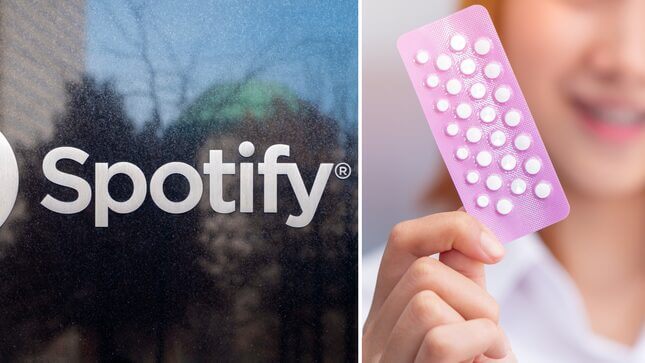Why Is Spotify Blocking Ads for Abortion Pills?
One organization, Mayday Health, has slammed the company for "hypocrisy" as it platforms abusers and right-wing peddlers of disinformation.
AbortionPolitics

Since September, Mayday Health—a nonprofit that shares information about accessing FDA-approved medication abortion pills—has been unable to get ads placed on Spotify. “Did you know you can still get an abortion in all 50 states? Abortion pills are available through the mail,” the ad says. “They’re safe, effective, and FDA-approved. Visit mayday.health to learn more. Mayday.health is responsible for the content of this PSA.”
A representative for Spotify originally told the organization that ads mentioning “abortion products and services, abortion providers and pregnancy counseling” are prohibited. But in October, the company told Bloomberg the representative had misspoken: Ads about a whole range of health services, from pharmaceuticals and dentists to contraceptives, are restricted except “in a limited capacity with certain limitations,” and not just abortion-related ads, the company clarified.
Still, as of this week, Mayday’s ad remains rejected. Last Thursday, Spotify told the organization and Bloomberg that it took issue with Mayday’s website linking to Aid Access, an international telehealth organization that ships abortion pills internationally via an India-based pharmacy. Aid Access, Spotify says, isn’t a verified pharmacy in LegitScript’s database—which, Aid Access has pointed out to Bloomberg, might be because it isn’t a pharmacy and doesn’t pretend to be.
Kaori Sueyoshi, the head of strategy for Mayday Health, told Jezebel that Spotify’s issue with Aid Access is irrelevant—their website includes extensive references to resources to get abortion pills, not just from Aid Access. “The internet exists, the abortion pill exists, those are two innovations that weren’t around when Roe v. Wade went into place. And so though Roe has fell, we can still protect the pill itself and education around it,” Sueyoshi said. At some point, Sueyoshi points out, abortion bans are going to assume “every permutation we can think of, but the one thing they can’t take away is accurate information and our access to education.” If corporations aren’t helping to disseminate that information, they’re effectively aiding anti-abortion politicians.
In a statement to Jezebel, Spotify said it rejected Mayday’s ad because Aid Access “relies on dispensing medication from a non-US based and non-FDA certified facility prescribed by a physician based outside of the US,” and that it “offered to work with Mayday Health on adjustments to ensure that they could run ads on the platform as we continue to accept advertisements for abortion services and FDA-approved medications that align to our ad policies.” But Mayday told Jezebel the organization stands by keeping a link to Aid Access on its webpage.
Since the overturning of Roe, it’s especially important that people in all states know about the existence of safe, effective medication abortion and the options available to them, but there are growing barriers to this. The South Carolina state legislature introduced legislation to criminalize the dissemination of information about medication abortion, and last week a far-right legal group sued to get the FDA to revoke its nearly 20-year-old approval of abortion pills.
Sam Koppelman, a co-founder of Mayday, told Jezebel it’s telling and an act of “hypocrisy” that Spotify continues to platform alleged abusers like Kevin Spacey, and rampant, life-threatening medical disinformation peddled by podcasts like The Joe Rogan Experience, which spent much of this year pushing deadly covid disinformation.
Mayday’s ads are “targeted at people in states without clinics, and optimized for lower income people,” Koppelman said. “The whole goal here is to get this info in front of the people who actually need it, who maybe can’t travel to another state or can’t afford to, and for whom abortion pills are the only option remaining in the way of them truly losing their rights.”
In contrast with Spotify, Bloomberg notes that Plan C, which also shares information and resources about how to safely get and use abortion pills, runs ads on iHeartRadio. Mayday runs ads on Google and Facebook without issue, and Sueyoshi told Jezebel the organization will begin running ads on Pandora next month, after receiving approval from the company on Saturday.
Mayday’s difficulties with Spotify are just the latest development in big tech’s evolving role in abortion access in our post-Roe nation. Abortion rights advocates have long flagged double standards in content moderation around their posts and ads about abortion pills, which are policed more harshly than ads and content pushing anti-abortion, medically unproven options for “abortion pill reversal.” Earlier this month, Twitter flagged content sharing accurate information about medication abortion for “self-harm” and penalized the user who posted it.
Social media companies and search engines like Google are also playing a growing role in supporting anti-abortion laws through surveilling and putting abortion seekers at risk of criminalization. Meta might allow some abortion-related ads, but as recently as July, it shared a Nebraska-based teen’s text conversations with law enforcement, resulting in her arrest for self-managing an abortion. Meta has a history of sharing abortion seekers’ data with anti-abortion crisis pregnancy centers. In addition to running misleading ads for CPCs—sometimes targeting them to patients at abortion clinics—nearly half of Google’s search results for “abortion” in some states lead to anti-abortion clinics, which collect data on abortion seekers.
It’s with this in mind, Koppelman says, that “we’ve optimized Mayday Health’s website to protect user privacy as possible,” ensuring it doesn’t track users’ IP addresses or any other personal data. “Big tech has a choice—to suppress speech about the abortion pill, or actually embrace the idea of free speech and allow this First Amendment-protected information that’s actually helpful to people that are on their platforms.”